 Home
News, and the latest updates.
Archives
Stories from the past...
Submit News
Got a item of interest? Here's the place to go.
Feedback
Your opinion always counts on how we can make GameSurge
even better.
Mailbag
Comments on our features, by you, the viewers. | 
Hardware
Tweaks, reviews and a handy driver index highlight our newest section
Reviews
Looking to buy one of the hottest games? We have it covered.
Previews
Get a advanced look at the games of tomorrow.
Interviews
Find out more about the people behind your favorite game.
Strategy
Need Help? We have a very large selection of walkthroughs now up.
Gallery
A special section featuring the best in artwork and
images. |

Editorials
The written word, by staff and viewers.
Game Guy
A bi-monthly column contributed by Mark H Walker, an independant writer in the Gaming community.
Gallery
Pictures from around the web.
Hosting
Our current hosting plans and features.
Site Information
Who we are, what we do, our policies and job positions.
|


PlayStation
The Sony PlayStation, and beyond...
Nintendo 64
Currently Down.
Dreamcast
The Dreamcast resource, and more. Home of the DC Technical pages. |
|
ShadowFlare
previewed by Falcon
System
Requirements:
P2 450+
Win 95+
128MB Ram
ShadowFlare
is a role playing game, which was originally published by Denyusha for the
Japanese market. Having taken off there, Emurasoft plans to bring an English
version of the game into the US and the rest of the world.
ShadowFlare is planned to be released in 4 separate chapters, and after a year out in
Japan, chapter one will be available for sale in the US from October this year.
The setting
for ShadowFlare is not unlike many other RPGs already on the market. It is
fantasy based, with human hero units, and a variety of mystical monster enemies
such as goblins and other demons.
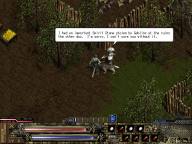
Contrary to most RPGS, the story actually takes place in the future. However
the type of weapons and spells are still consistent with the traditional medieval fantasy realm. The story starts from a cataclysmic
event, the human civilization was almost destroyed by a horde of demons. These
demons appeared though a portal from another world, almost destroying the human
race. Now humanity is taking a stand and fighting back, where warrior and
magical heroes are engaged in a war to take back their control of the world.
The
background for episode one takes place in a small town, where mercenaries have
been called for into battle against a new kind of demon – the gargoyle. You, as the mercenary hero
have to complete a series of missions given to you by your commander, or a
variety of other NPC units in the game. This mission-based system will take the
player along though the storyline, where there will be further plot developments as well as
further information relating to the background of the story of the game.
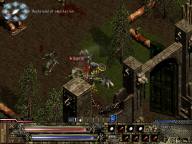 As a
conversion from a Japanese to English language game, some aspects, including
character dialogue can seem strange due to the nature of the language
conversion. These issues, should however be fixed by the final release. Apart of this though, the gameplay remains unchanged from the
Japanese version.
There are
also some different concepts from typical English based games such as
“capsules” and “tablets” in the place of health and mana potions.
Most
aspects of any other RPG are evident in ShadowFlare. You control a hero, who
can level up by gaining experience through killing enemy units. There are a
variety of weapons at your disposal including swords and bows, as well as many
offensive and defensive magical spells. There is a base town, where you can
purchase, sell and repair items, as well as visit the witch who can give advice
and heal you. Items can be purchased, found throughout the map, or dropped by
slain enemies, and can be either normal or magical. Magical items can provide
stat or ability bonuses to the hero.
The developers have also added in a
GUI which includes the character inventory as well as a minimap to make the gameplay
easier. ShadowFlare also uses the typical point and click interface with hotkeys available, which is easy to learn and manage.
Where the game differs is in the introduction of several unique features.
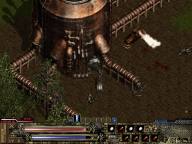 Firstly is
the way in which a profession is chosen – rather than picking a character type
at the start of the game, you start off with a generic male or female
mercenary, and as you level up you can branch into one of three fields – the
warrior, who is adept at melee combat, the hunter, who is skilled in long range
fighting, and the wizard/witch, who specializes in spell casting. As the character
levels up, a profession can be chosen, and possibly changed with further
experience increases. The character’s profession affects the changes to the
characters statistics, such as attack rate and spell abilities, but it would also
have been nice to be able to manually distribute some of the bonuses when
leveling up.
Another
unique feature is the “buddy system” in which you can have an animal companion
to help attack the enemy, or perform acts such as opening a door or picking up
an item. The game is at a fairly high difficulty level so the introduction of a
helper unit is welcome, although can be slightly unbalanced in that a dog can
kill an enemy as fast as the hero, and seems to live a lot longer as well.
Although the difficulty of some monsters may be difficult, it is also very hard
to die due to the ease that a character can flee a battle, significantly
outrunning any of the enemies. Death is also not too much of an inconvenience –
you will spawn back in the town minus one item you had been carrying, which
will have to be picked back up from where you died.
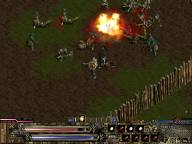 A feature
that is slightly out of characteristic with the rest of the game is the ability
to lay mines. These mines are powerful explosives that can destroy several
enemies at once, but they do feel a bit out of place when combined with swords
and magic spells. They can also be slightly overpowered, for example I managed to
run into the middle of a large group of goblins, lay a mine, and run out in time to
watch about a dozen of them fall from the blast.
In terms of
depth of gameplay, there are additional features in ShadowFlare, such as the
tower of ordeal where a hero can practice battling against demons in order to
level up and find magical items. Additionally there is the “card game” where
you can play blackjack against a wizard in the tower in order to win gold or
magical items.
The
graphics in ShadowFlare are unfortunately quite dated. Not only is there a
significant lack of customizability, the game looks like it is running with
graphics technology from several years ago. The game runs on a 2D engine with
low 640x480 resolution with low graphics detail, and there are no options
available to modify the resolution or quality. The reason for this is that the
game was originally released as shareware, so the developer had to keep in mind
the file size, as it was to be distributed online. Hopefully the future
chapters will be released with a more advanced and better-looking graphics
engine.
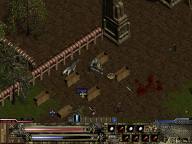 There are
both indoor and outdoor scenes, including wilderness and dungeon areas. These
are however, quite limited in scope and only have a small variation though the
game. The wilderness areas include trees and copper piping, while dungeon areas
are all made of stones with some decorations.
The
characters do change visually between the character classes as well as with
different pieces of equipment, but the pixels are fairly large leading to badly
defined animations of the characters and their inventories. The game could also
have done with a larger variety of monsters, and enemy models could also do
with more work, for example the goblins look like little clay-molded men.
The audio
consists of fairly standard sound effects of weapon attacks, spellcasting,
deaths, etc. There is also background music, which consists of a few different
music files. Which one is being played will depend on the scenario that the
character is in. Usually a music track will subtly enhance a game by adding to
the atmosphere, as in to immerse a player into the game. While the tracks in
ShadowFlare do complement the environments and player situations, I found the
tracks to be a bit repetitive and somewhat annoying after a while.
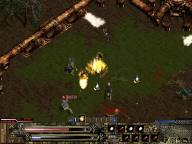 ShadowFlare
also boasts a multiplayer capability for up to 4 players to play cooperatively
against the monsters. The game is able to be run over TCP/IP, and in the future
Emurasoft plans to set up a website where players can meet and play together,
or exchange items and tips.
Overall
ShadowFlare is a welcome attempt by Emurasoft to enter the RPG market. There
are several innovative and interesting features, and the variety of gameplay,
including an array of spells and weapons and an unfolding storyline should be
enough to keep a gamer occupied. However, while graphics does not mean
everything, it would have been nice to see some better looking graphics even
taking into account the attempt to keep the game size small. Many MMORPG’s have
been released with far better looking graphics within the 100-150MB size
bracket. With an improvement in this area, as well as the audio effects,
ShadowFlare could well make it’s mark on the US market.
Back to previews index
|
 |
|
|
Zalman: ZM-DS4F Headphones
|
An affordable, ultra-portable headphone set.
 more more
|
|
